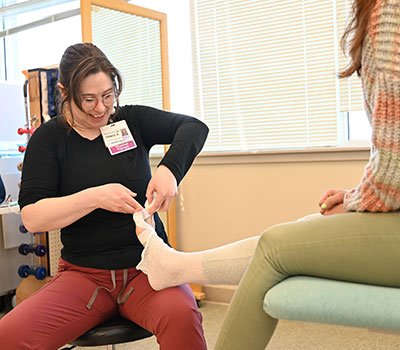Lymphedema Care
If you have been diagnosed with lymphedema, MaineGeneral Outpatient Rehabilitation is here to help, with occupational and physical therapists who are specially trained in preventing and treating lymphedema.
What is Lymphedema?
 The lymphatic system collects and filters fluid from our body tissue into our circulatory system. Lymphedema occurs when a disruption to the lymphatic system causes fluid retention in one or more parts of the body. Lymphedema can:
The lymphatic system collects and filters fluid from our body tissue into our circulatory system. Lymphedema occurs when a disruption to the lymphatic system causes fluid retention in one or more parts of the body. Lymphedema can:
- Occur at birth, be hereditary or develop later in life from unknown causes due to a malformation of the lymphatic vessels
- Result from an injury or surgery that causes physical damage
- Happen after an illness or cancer damages the lymph system
- Result from the removal of lymph nodes and/or radiation therapy to treat the lymph nodes or surrounding tissue
Signs of Lymphedema
- Slow or rapid onset of swelling that may be progressive
- Discomfort (not pain) is common, with a feeling of heaviness or achiness
- Pitting of the skin
- Recurring skin infections (cellulitis)
- Hardening and thickening of the skin (fibrosis)
The good news is that education and early interventions can manage risk factors or treat lymphedema. That's where MaineGeneral's specially trained therapists come in!
Lymphedema Treatment
For many patients, lymphedema doesn't develop until months or even years after the initial damage has occurred. It usually affects the legs or arms but also may affect the chest, abdomen, neck, face or genitals.
Lymphedema presents a constant risk of developing an uncontrolled infection, skin breakdown and an inability to use the affected limb.
Several members of our therapy staff have completed advanced training to be qualified to treat lymphedema and have achieved the credentials of certified lymphedema therapist (CLT). The program requires 135 hours of training time.
Our Approach to Care
Your therapist may recommend Complete Decongestive Therapy (CDT). This includes Manual Lymph Drainage (a gentle massage-like technique to move fluid out of the effected region), compression bandages, exercise and education. This is the first phase of treatment where the limb or affected area is reduced.
In the second phase of care, you will be expected to wear compression garments and manage your lymphedema independently. Due to this condition being progressive and chronic, we recommend that you have an annual appointment with your CLT.
If you need compression garments, our therapists can advise you on what you need, measure you for these items and help you order them from the vendor you choose.
Tips for Managing Lymphedema Risks
People who have surgery to remove lymph nodes in the armpit have elevated risks for developing lymphedema and should purchase and use a well-fitting compression sleeve.
The sleeve is one of the most important tools to manage participation in activities that contribute to loading of the lymphatic system.
Follow these tips to minimize the risk of developing lymphedema:
- Avoid blood draws, IVs, blood pressure cuffs or injections in the affected limb
- Exercise regularly while wearing your compression sleeve. This may be as simple as going for a walk.
- Maintain good hygiene. Clean the affected area daily, be gentle when drying it and keep it moisturized.
- Take caution with nail care. Avoid cutting cuticles or allowing nails to grow too long.
- Protect your skin during activities that may cause cuts or scrapes, such as wearing gloves when gardening.
- Avoid excess sun exposure and sunburns by wearing long sleeves, UV protective gloves and/or applying and re-applying sunscreen.
- Follow up with a CLT as soon as possible if you suspect you have swelling in the affected limb.
Contact Us
Ask your primary care clinician if you could benefit from a referral to MaineGeneral's Lymphedema Program. To learn more about the care we offer, please call:
- Augusta: (207) 621-7500
- Waterville: (207) 872-4400
- Oakland: (207) 873-8140